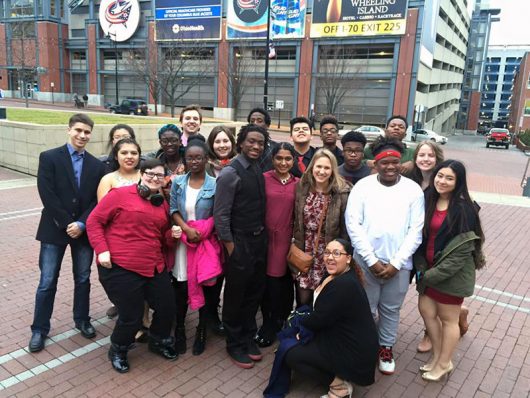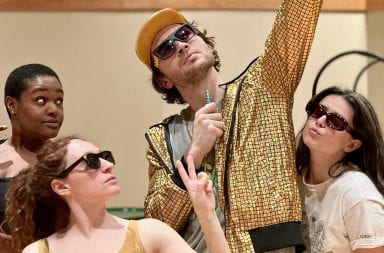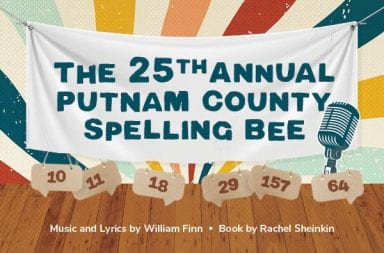
TAG students attending Motown the Musical at the Ohio Theatre in February. Credit: Courtesy of Annelise Dahl
Just five months after becoming an official Ohio State student organization, the Ohio State Theatre Arts Group has begun expanding its focus on students in the theater. It’s now rolling out a pilot program that shifts from teaching only high-school students to teaching elementary-school students as well.
TAG began as a theatrical learning experience for high-school students at Columbus North International High School, a public high school in the north side of Columbus. OSU students teach high-school students how to sharpen their creative writing skills and how to apply those skills on the stage, said Annelise Dahl, president of the group and a third-year in finance.
TAG’s new program at Hubbard Mastery School, an elementary school in Columbus, offers more opportunities for younger students to get involved and provides a diversity of material to these students, Dahl said.
“It’s a cool opportunity to outreach (elementary school students) and start them at an earlier age,” she said.
Though the group has worked with high-school students for more than two years, transitioning into working with elementary-school students means there will be new obstacles for the students to overcome. Dahl said TAG members feel confident.
By showing younger students the group’s core values, Dahl said the message will not change, but the strategy of teaching will.
“A lot of the planning has been around the age shift and thinking about who we are working with,” said Flora Hong, a member of TAG and a second-year in psychology. “Some may not have as good as attention spans, or longer attention spans, and also keeping it more fun and less didactic.”
TAG meets with the high-school students after school hours. In the new program, the group will be visiting classrooms during class time to set up a language-arts-based curriculum focused on performing arts. Both Dahl and Hong said this strategy was created for logistical reasons, however, the hope is that having students in a classroom setting will help keep them guided and give them a chance to apply what they are learning.
“It is really different than working with high-school students because, with high-school students, it’s much easier to guide them and let them be self-autonomous,” Flora Hong said. “With elementary-school students, I think it is much harder because (the lessons) have to be more guided.”
In the Fall Semester, TAG began running its version of an open-mic night with its high-school students, where they practiced some of the things they have learned through the group, such as performing self-written work or singing. In a coffee-shop setup, both students and faculty of the high school came to watch their peers perform.
“I think we got a lot of good feedback,” Hong said. “I remember Destiny (a high school student) saying it was a good way to express feelings and things she had wanted to do.”
Though with high-school students TAG focuses heavily on the writing aspect, performing plays and giving students an avenue to express their emotions are core values of the group, Dahl said.
Now in the process of auditions for their upcoming play in the spring, Dahl and Hong said they hope to use this time to break away from the writing aspect of theater and dive into deeper concepts.
“Our play, for the first time, is going to be pre-written,” Dahl said. “This is a great opportunity to teach more acting skills, character development and how you portray a character.”
Many of the students TAG works with are nearing the end of their high-school careers and Dahl and Hong have noticed changes within the students they work with. Students have experienced a confidence boost, both on stage and in their daily lives, Dahl said. Although she is reluctant to attribute the confidence boost to theater, Dahl said she believes it has had a positive impact on these students.
“By the time the students graduate, they have become more confident and more aware of themselves,” Dahl said. “I’d like to think that theater helps with that because it is a way to express yourself and when you express yourself, you start to digest things like who you are and what you care about.”
The Engaged Scholars logo accompanies stories that feature and examine research and teaching partnerships formed between the Ohio State University and the community (local, state, national and global) for the mutually beneficial exchange of knowledge and resources. These stories spring from a partnership with OSU’s Office of Outreach and Engagement. The Lantern retains sole editorial control over the selection, writing and editing of these stories.



